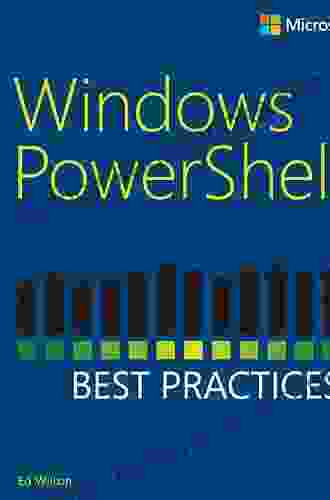Windows PowerShell Best Practices: A Guide to Developing Robust, Maintainable Scripts and Modules

Windows PowerShell is a powerful scripting language and automation platform that can help you streamline your IT tasks and improve your productivity. However, writing effective PowerShell scripts and modules requires careful attention to best practices. In this article, we will explore some of the most important best practices for developing robust, maintainable PowerShell code.
1. Use Clear and Concise Code
One of the most important best practices for writing PowerShell code is to use clear and concise language. This means using meaningful variable names, functions, and commands. It also means avoiding unnecessary complexity and duplication.
4.4 out of 5
| Language | : | English |
| File size | : | 11095 KB |
| Text-to-Speech | : | Enabled |
| Screen Reader | : | Supported |
| Enhanced typesetting | : | Enabled |
| Print length | : | 1069 pages |
Here is an example of clear and concise PowerShell code:
powershell # Define a function to get the current date and time function Get-CurrentDateTime { Get-Date -Format "yyyy-MM-dd HH:mm:ss" }
This code is easy to read and understand, and it can be used to get the current date and time in a consistent format.
Here is an example of unclear and complex PowerShell code:
powershell # Get the current date and time $date = (Get-Date).ToString("yyyy-MM-dd HH:mm:ss")
This code is more difficult to read and understand, and it is also more prone to errors.
2. Use Error Handling
Another important best practice for writing PowerShell code is to use error handling. This means handling errors gracefully and providing meaningful error messages.
Here is an example of PowerShell code that uses error handling:
powershell try { # Get the current date and time $date = Get-Date -Format "yyyy-MM-dd HH:mm:ss" }catch { # Handle the error Write-Error "An error occurred while getting the current date and time." }
This code will handle any errors that occur while getting the current date and time and will provide a meaningful error message.
3. Use Modular Code
Modular code is code that is organized into small, reusable units. This makes it easier to read, maintain, and reuse your code.
Here is an example of modular PowerShell code:
powershell # Define a function to get the current date and time function Get-CurrentDateTime { Get-Date -Format "yyyy-MM-dd HH:mm:ss" }
# Define a function to format the current date and time function Format-CurrentDateTime { $date = Get-CurrentDateTime $date -Format "dd/MM/yyyy HH:mm:ss" }
This code is modular because it is organized into two small, reusable functions. This makes it easier to read, maintain, and reuse the code.
4. Use Proper Documentation
Proper documentation is essential for maintaining and updating your PowerShell code. This documentation should include information about the purpose of the code, how to use it, and any limitations.
Here is an example of proper PowerShell documentation:
powershell # function Get-CurrentDateTime { Get-Date -Format "yyyy-MM-dd HH:mm:ss" }
This documentation provides information about the purpose of the code, how to use it, and an example of how to use it.
5. Use Version Control
Version control is a system that allows you to track changes to your code over time. This makes it easier to collaborate with others, roll back changes, and recover from mistakes.
There are many different version control systems available, such as Git and Subversion. If you are not already using a version control system, I highly recommend that you start using one.
6. Test Your Code
Testing your code is essential for ensuring that it works correctly. This can be done by writing unit tests, integration tests, and performance tests.
Unit tests test individual functions and modules. Integration tests test how different functions and modules work together. Performance tests test the performance of your code under different loads.
Testing your code can help you identify and fix errors early in the development process. This can save you time and frustration in the long run.
7. Use the PowerShell Best Practices Analyzer
The PowerShell Best Practices Analyzer is a tool that can help you identify and fix common PowerShell coding errors. This tool is available as a free download from the Microsoft website.
The PowerShell Best Practices Analyzer can help you improve the quality of your code and make it more robust and maintainable.
By following these best practices, you can develop robust, maintainable PowerShell code that will save you time and frustration in the long run.
Here is a summary of the key best practices:
* Use clear and concise code. * Use error handling. * Use modular code. * Use proper documentation. * Use version control. * Test your code. * Use the PowerShell Best Practices Analyzer.
By following these best practices, you can improve the quality of your PowerShell code and become a more effective PowerShell developer.
4.4 out of 5
| Language | : | English |
| File size | : | 11095 KB |
| Text-to-Speech | : | Enabled |
| Screen Reader | : | Supported |
| Enhanced typesetting | : | Enabled |
| Print length | : | 1069 pages |
Do you want to contribute by writing guest posts on this blog?
Please contact us and send us a resume of previous articles that you have written.
 Book
Book Novel
Novel Page
Page Chapter
Chapter Text
Text Story
Story Genre
Genre Reader
Reader Library
Library Paperback
Paperback E-book
E-book Magazine
Magazine Newspaper
Newspaper Paragraph
Paragraph Sentence
Sentence Bookmark
Bookmark Shelf
Shelf Glossary
Glossary Bibliography
Bibliography Foreword
Foreword Preface
Preface Synopsis
Synopsis Annotation
Annotation Footnote
Footnote Manuscript
Manuscript Scroll
Scroll Codex
Codex Tome
Tome Bestseller
Bestseller Classics
Classics Library card
Library card Narrative
Narrative Biography
Biography Autobiography
Autobiography Memoir
Memoir Reference
Reference Encyclopedia
Encyclopedia Ananta Ripa Ajmera
Ananta Ripa Ajmera Amber Hatch
Amber Hatch Amy Lynn Mcconahy
Amy Lynn Mcconahy Anatoly Volkhover
Anatoly Volkhover Annemarie Colbin
Annemarie Colbin Patricia Wells
Patricia Wells Tony Singh
Tony Singh Ian Benton
Ian Benton Amit Arad
Amit Arad Amy Thomas
Amy Thomas Melissa Cynova
Melissa Cynova Amy Herring
Amy Herring Randy Clemens
Randy Clemens M Caterina Mortillaro
M Caterina Mortillaro Andre Aiken
Andre Aiken Andrew Duguid
Andrew Duguid American Girl
American Girl Justine Toh
Justine Toh Jeanne Sauvage
Jeanne Sauvage Hugh Markus
Hugh Markus
Light bulbAdvertise smarter! Our strategic ad space ensures maximum exposure. Reserve your spot today!

 Emmett MitchellThe Ultimate Guide to Self-Care for Caregivers of Loved Ones with Dementia...
Emmett MitchellThe Ultimate Guide to Self-Care for Caregivers of Loved Ones with Dementia...
 Bruce SnyderUnderstanding the Book: A Comprehensive Guide with References to Quran and...
Bruce SnyderUnderstanding the Book: A Comprehensive Guide with References to Quran and... Hudson HayesFollow ·16.3k
Hudson HayesFollow ·16.3k Corey HayesFollow ·5.6k
Corey HayesFollow ·5.6k Dion ReedFollow ·2.3k
Dion ReedFollow ·2.3k Franklin BellFollow ·13k
Franklin BellFollow ·13k Brennan BlairFollow ·7.5k
Brennan BlairFollow ·7.5k Jaime MitchellFollow ·8.3k
Jaime MitchellFollow ·8.3k Levi PowellFollow ·2k
Levi PowellFollow ·2k Jessie CoxFollow ·7.7k
Jessie CoxFollow ·7.7k

 Miguel Nelson
Miguel NelsonFour Cookbooks In One: Recipes To Fight Cancer, Heart...
Looking for a healthy way...

 Marcus Bell
Marcus BellHearts and Souls: Exploring the Lives and Legacies of...
The Special Olympics movement has been a...

 Tony Carter
Tony CarterDiagnosed With Breast Cancer: Navigating Life After the...
A breast cancer diagnosis can be a...

 Joe Simmons
Joe SimmonsLiddypool: The Stories and Interviews – A Literary...
In the realm of...

 Jett Powell
Jett PowellBreakfast for Boneheads: 66 Breakfast Recipes for Lazy...
Are you tired of eating the...
4.4 out of 5
| Language | : | English |
| File size | : | 11095 KB |
| Text-to-Speech | : | Enabled |
| Screen Reader | : | Supported |
| Enhanced typesetting | : | Enabled |
| Print length | : | 1069 pages |










